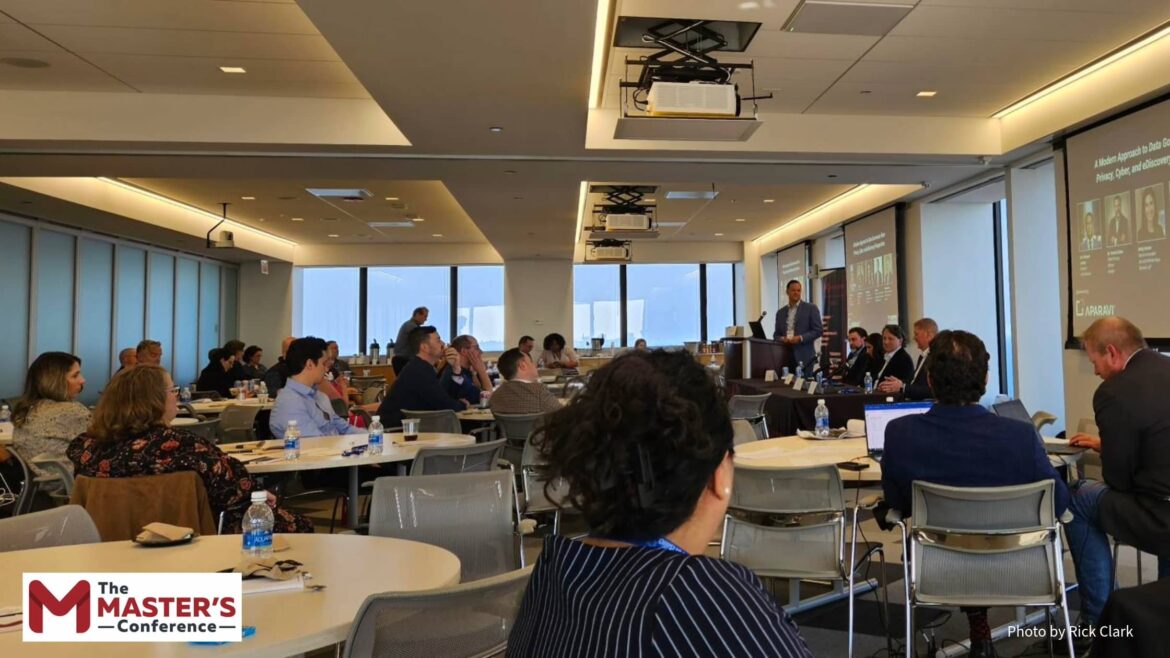eDiscovery Daily Blog
The 2024 Masters Conference in Chicago: A Comprehensive Recap
By Rick Clark
Since the inaugural Masters Conference in Washington DC in 2006, I have cherished how these conferences create a space for community engagement, learning from timely educational content, and exchanging ideas on how to improve how legal work gets done. While I’ll share my professional takeaways, I want to begin by expressing my gratitude for the Masters Conference legal community.
I don’t know exactly what it is, but I always return home from these single-day conferences feeling like a better person. The day’s conversations and networking events enable me to form deep relationships that positively impact me personally and professionally. Perhaps it’s the shared experience of navigating the complex world of eDiscovery, or our collective work ethics. Regardless of the reason, these events inspire me to be a better employee, technologist, and person.
Special thanks to Kelly Twigger, Jill Rorem, Daryl Greene, Cat Casey, and the entire Masters Conference team.
Professional Insights and Sessions
On the professional front, I learned a great deal, including insights from a session that delved deeply into the world of Generative Artificial Intelligence (GAI). Most sessions I attended revolved around the impacts and management of modern data.
The first session I attended was “Navigating the Hybrid eDiscovery Terrain: A Closer Look at Automation and Resource Efficiency.”
Panelists:
Ryan Merholz – GeorgeJon – Technical Services
Chris Bojar – Barack Ferrazzano LLP – Director of eDiscovery
John Evans – Perkins Coie LLP – Digital Forensics Consultant
Mira Edelman – Dish Network – Senior Corporate Counsel
Paul Noonan – United Airlines – Managing Counsel – eDiscovery and Information Governance
Key Takeaways:
Chris Bojar: Automation is more manageable with a small team, but implementing automated workflows in an eDiscovery review platform can significantly reduce human errors. Ticketing systems help standardize request requirements, while Software as a Service (SaaS) enables easy scaling and cost savings. By leveraging cloud infrastructure, firms avoid the expense of maintaining peak usage hardware.
John Evans: Data volumes and types have expanded significantly, making automation crucial. Forensic tools have become more effective in processing data, and web capture technologies have streamlined data collection through automation.
Mira Edelman: Integrations offer new automation opportunities, especially for in-house teams. Ticketing systems foster collaboration between IT and legal departments. Automated tasks through matter management systems improve efficiency. Companies need integration plans when acquiring others with different systems to maintain healthy operations. Manual processes should be deployed temporarily until full integration is achieved.
Paul Noonan: Rogue corporate communication platforms pose challenges in data collection. Automated processes in preservation, collection, and processing are essential. Connectors enhance automation, and insourcing helps control and automate preservation and collection tasks. Interoperability among eDiscovery platforms is beneficial as different platforms excel in various areas.
The second session I attended was an overview of what could be a master’s program class on Large Language Models. I took a few notes and takeaways, but there is MUCH more for me to learn here. The session was titled “LLM’s Unmasked: A Deep Dive into Legal Industry Realities.”
Panelists:
Dr. Igor Labutov – LAER AI – Founder & CEO
Sanjay Manocha – LAER AI – Chief Growth Officer
Key Takeaways:
Sanjay Manocha: Building AI models with written instructions and document examples can automate review and data extraction across enterprise data. This involves using AI to maintain factual accuracy in responses, whether via email or chat, and validating results through prototypes.
Dr. Igor Labutov: During pre-training, a lack of content can lead to hallucinations or incorrect information in LLMs. To leverage LLMs reliably, pretraining must ensure world (refers to the accuracy of the AI’s responses based on real-world facts and information.) case (based on case data), and legal knowledge (based on general legal knowledge) accuracy. The correctness of responses depends on the data embedded in the LLM. Challenges include scalability to millions of documents, validation difficulties, error accumulation, lack of transparency, and limited reasoning capabilities.
To evaluate LLM solutions, create datasets, measure retrieval performance (precision/recall), and assess the engine’s end-to-end performance. LAER AI’s approach involves leveraging multiple data sources and models for more accurate outcomes.
Another insightful session covered “The Data Explosion and Attorneys’ Ethical Duty of Technical Competence”
Panelists:
Jenny Schroeder – Disco
Alisa McLellen – Disco
Dennis Garcia – Microsoft
Daniel Kelly – Sidley Austin LLP
Tony Baskin – Perkins Coie LLP
Key Takeaways:
Dennis Garcia: Competence has improved, especially with the technology adoption surge during the pandemic. Younger employees and user-friendly platforms help bridge the skill gap, enhancing overall competence.
Tony Baskin: Advanced review platforms allow attorneys to engage directly with data, reducing communication gaps and enabling more hands-on involvement. States are introducing new ethical guidelines to ensure technical competence.
Competency Areas:
Data Security
Electronic Discovery
Technology for efficient practice management
Technology used by clients
Technology for courtroom presentations
Dennis emphasized the importance of embracing change despite initial challenges, while Tony encouraged seeking better, more efficient methods for tedious tasks.
Final Thoughts
I am profoundly grateful to the eDiscovery community and events like the Masters Conference for keeping me up to date with technology and workflow trends in managing modern data. These conferences not only enhance my professional skills but also provide an opportunity to connect with incredible industry professionals. Thank you all!

About the Author
Rick Clark is VP, Strategic Partnerships at CloudNine and has 20+ years of experience in forensics and eDiscovery. Focused on innovation and education, he co-founded ESI Analyst, now CloudNine Analyst, as well as Wave Software and the Master’s Conference.

